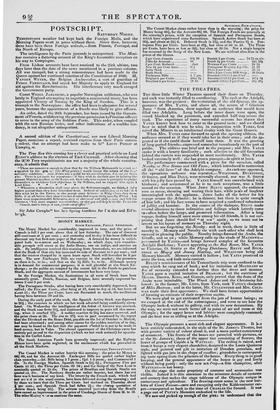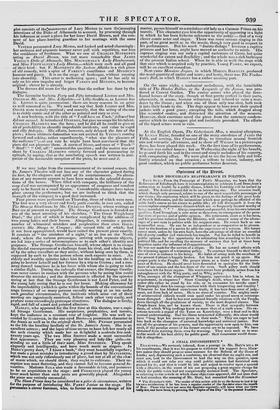The Olympic presents a most rich and elegant appearance. It
he.s been entirely redecorated, in the style of the St. James's Theatre, but with greater variety of colour about it, and a more perfect consistency of' ornament. The fronts of the boxes are panneled with pictures, as at the St. James's; those of the upper tier consisting of flowers, the lower of groups of Cupids a la WATTEAU. The ceiling is raised, and from it bangs a very elegant chandelier, designed in the Louis Quatorze style, and painted and gilt in imitation of Dresden porcelain, and lighted with gas-jets in the shape of candles ; girandoles in correspond- ing taste spring from the pilasters of the boxes. Every thing is in good keeping, and the general appearance of the house is gay and lively without being gaudy : only the new act-erop—a fete champetre, after WATTEAU—is WO heavy.
011 the stage the same propriety of costume and accessories was visible. Indeed it is this attention to the minutest details of costume and scenery that makes the stage tableaus of the Olympic unique ia correctness and splendour. The drawing-room scene in the new bur- letta of Court Favour—save and excepting only the Kidderminster car- pet—transported us back to the time of CHARLES the Second. It was a page out of PEEVES'S Memoirs embodied to the life.
We saw and picked up enough of the piec3 to understand that the
plot consists of the:manceums of Lucy Morton to ' turn the:annoying attentions of the Duke of Albemarle to account, by procuring through his influence at court a place for her lover David Brown, and the con- sent of her place-hunting guardian to her marriage with the same
David.
VESTRIS personated Lucy Morton, and looked and acted charmingly : her archness and piquante manner never pall with repetition, nor lose the semblance of freshness. What we S8W of CHARLES MATHEWS'S acting as David Brown, was not more remarkable than JAMES VINING'S Duke of Albemarle, Mrs. MACNAMARA'S Lady Flambercourt, and Miss FITZWALTER'S Lady Hinton,—which were each and all good of their kind : but F. Marnews's Sir Andrew Allsides is a rich piece of old comedy, with a spice of FARREN'S courtliness and MUNDEN'S humour and gusto. It is on the verge of burlesque, without running into absurdity. This actor is mellowing apace ; and he has only to rely on his own impulse and forget FARREN and MUNDEN, to become original : clever he is already.
The dresses did more for the piece than the author has done by the dialogue.
The favourite burletta Forty and Fifty introduced Lisrox and Mrs. ORGER as Mr. and Mrs. Lillywhite—or Lilly-double-u, as LISTON has it. LtsroN is quite juvenescent : there are many seasons in an actor so well seasoned as lie. We need not say that both L1sroN1 and Mrs. One ER were warmly received; and scarcely, that the acting of the one is as richly comic and of the other as pointed and racy as ever. A new burletta, with the title of" / will have an Uncle," followed but did not succeed. It introduced OXBERRY, but gave no scope for his talent. CHARLES MATHEWS was the hero; and he did all he could to give an air of probability to absurdly improbable incidents, and value to vapid and silly dialogue. His efforts, however, only delayed the fate of the piece ; whose ultimate damnation was not averted by VINING'S coming forward and asking, rather superfluously, "what was the pleasure of the audience ? "—at any rate he might have been convinced that the piece did not pleasure them. A storm of hisses, and cries of " Trash !" " Stuff ! " " Off, off! " answered the question ; and the matter was cut short by CHARLES MATHEWS coming forward and pronouncing its epitaph, by saying, that as the concluding speech was written in anti- pation of the favourable reception of the piece, he must omit it.



























 Previous page
Previous page